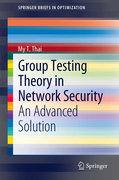
Group Testing Theory in Network Security explores a new branch of group testing theory with an application which enhances research results in network security. This brief presents new solutions on several advanced network security problems and mathematical frameworks based on the group testing theory, specifically denial-of-service and jamming attacks. A new application of group testing, illustrated in this text, requires additional theories, such as size constraint group testing and connected group testing. Included in this text is a chapter devoted to discussing open problems and suggesting new solutions for various network security problems. This text also exemplifies the connection between mathematical approaches and practical applications to group testing theory in network security. This work will appeal to a multidisciplinary audience withinterests in computer communication networks, optimization, and engineering. Brand new solutions on several advanced networks security problems, which may advance the research front on this area. New variants on the group testingtheory, which enhance the research results in this field Great connection between mathematical approaches and practical applications. Solutions are verified both in theoretical analysis and simulation results. Include a chapter discussing open problems and suggesting new solutions for various network security problems. INDICE: -1. Group Testing (Introduction, Basic Theory and Design, Applications in Network Security). -2.Size Constraint Group Testing and DoS Attacks (Overview, Network System Models, Size Constraint Group Testing, Matrix Construction and Latency Analyses, Detection System Configuration, Experimental Analysis). -3. Interference Free Group Testing and Reactive Jamming Attacks (Overview, Problem Models and Preliminaries, Group Testing based Trigger Node Identification-Preprocessing, Identifying Trigger Nodes(ITN) Algorithm, Theoretical Analysis, Experimental Analysis). -4. Randomized Fault Tolerant Group Testing and Advanced Security (Advanced Attacker Model, Error-tolerant Randomized Non-Adaptive Group Testing, Clique-Independent Set, Advanced Trigger Node Identification, Advanced Solutions Toward Sophisticated Attack Models, Experimental Analysis). -5. Outlooks (General Detection Framework based on Group Testing, Size Constraint Group Testing, Jamming Attacks and Trigger Node Detection).-References. – Index.
- ISBN: 978-1-4614-0127-8
- Editorial: Springer New York
- Encuadernacion: Rústica
- Páginas: 86
- Fecha Publicación: 28/12/2011
- Nº Volúmenes: 1
- Idioma: Inglés
